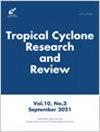为第十期热带气旋国际讲习班(IWTC-10)审查的包括人工智能算法在内的客观卫星方法
IF 4.1
4区 地球科学
Q3 METEOROLOGY & ATMOSPHERIC SCIENCES
引用次数: 0
摘要
本文探讨了最近四年(2019-2022)利用卫星数据客观分析热带气旋的情况,并提出了改进分析的建议。我们首先讨论了从SAR和地球静止成像仪直接检索的新方法。接下来,我们调查了人工智能中一些最突出的新技术,并讨论了它们的主要功能(特别是非线性TC行为的准确性,模型不确定性的表征和合成卫星图像的创建)和局限性(特别是缺乏透明度和有限数量的训练数据)。我们还确定了对最佳跟踪记录中偏差和未标记不确定性的关注,这是客观方法进一步发展的一阶限制。文章最后提出了改进未来客观方法的建议,特别是在更准确和可靠的训练数据集方面。本文章由计算机程序翻译,如有差异,请以英文原文为准。
Objective satellite methods including AI algorithms reviewed for the tenth International workshop on tropical cyclones (IWTC-10)
Here we explore the latest four years (2019–2022) of using satellite data to objectively analyze tropical cyclones (TC) and issue recommendations for improved analysis. We first discuss new methods of direct retrieval from SAR and geostationary imagers. Next, we survey some of the most prominent new techniques in AI and discuss their major capabilities (especially accuracy in nonlinear TC behavior, characterization of model uncertainty and creation of synthetic satellite imagery) and limitations (especially lack of transparency and limited amount of training data). We also identify concerns with biases and unlabeled uncertainties in the Best Track records as being a first-order limitation for further progress in objective methods. The article concludes with recommendations to improve future objective methods, especially in the area of more accurate and reliable training data sets.
求助全文
通过发布文献求助,成功后即可免费获取论文全文。
去求助
来源期刊

Tropical Cyclone Research and Review
METEOROLOGY & ATMOSPHERIC SCIENCES-
CiteScore
4.60
自引率
3.40%
发文量
184
审稿时长
30 weeks
期刊介绍:
Tropical Cyclone Research and Review is an international journal focusing on tropical cyclone monitoring, forecasting, and research as well as associated hydrological effects and disaster risk reduction. This journal is edited and published by the ESCAP/WMO Typhoon Committee (TC) and the Shanghai Typhoon Institute of the China Meteorology Administration (STI/CMA). Contributions from all tropical cyclone basins are welcome.
Scope of the journal includes:
• Reviews of tropical cyclones exhibiting unusual characteristics or behavior or resulting in disastrous impacts on Typhoon Committee Members and other regional WMO bodies
• Advances in applied and basic tropical cyclone research or technology to improve tropical cyclone forecasts and warnings
• Basic theoretical studies of tropical cyclones
• Event reports, compelling images, and topic review reports of tropical cyclones
• Impacts, risk assessments, and risk management techniques related to tropical cyclones
 求助内容:
求助内容: 应助结果提醒方式:
应助结果提醒方式:


